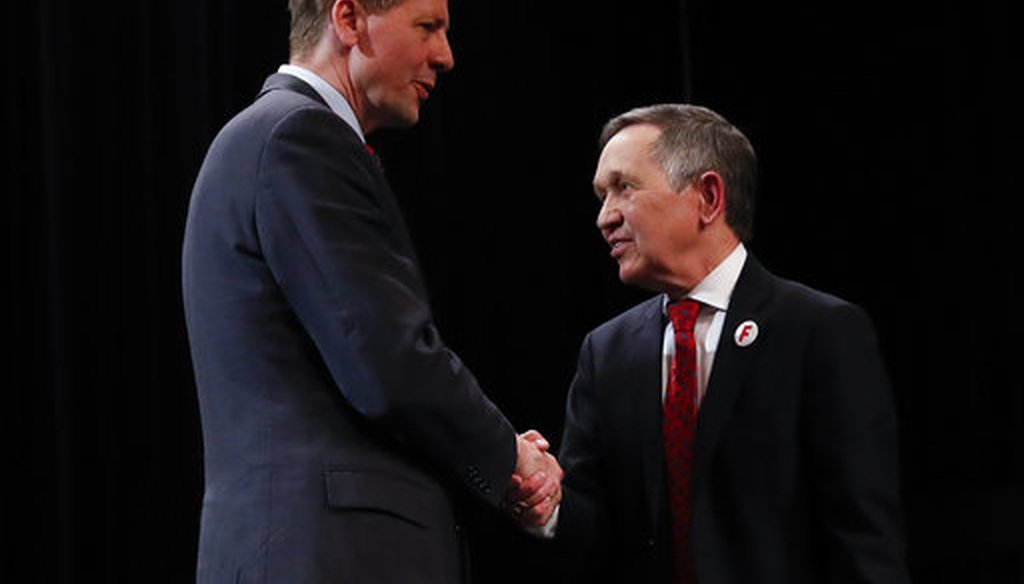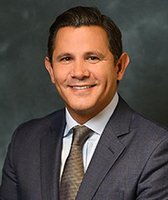Stand up for the facts!
Our only agenda is to publish the truth so you can be an informed participant in democracy.
We need your help.
I would like to contribute

Richard Cordray, former federal consumer protection chief, left, and former U.S. Rep. Dennis Kucinich, right, shake hands after the Ohio Democratic Party debate in the primary race for governor, April 10, 2018, at Miami (Ohio) University. (AP)
Ohio’s Democratic primary for governor has become a nationally-watched battle as the left tries to figure out how to secure a win in a state swept by Donald Trump in 2016.
On the Republican side, two long-time politicians attacked each other’s records as they fought for the conservative mantle with hopes to replace term-limited Gov. John Kasich.
On May 8, voters will cast ballots in partisan primaries for governor as well as a Republican primary to decide who takes on Democratic U.S. Sen. Sherrod Brown in November.
The closest contest is the Democratic primary for governor, which features former U.S. Rep. Dennis Kucinich and President Barack Obama’s former consumer protection chief Richard Cordray.
Kucinich has hammered Cordray over Cordray’s record on gun rights. Kucinich has had to defend his campaign finance disclosure about a speech he gave about Syria.
Here’s a summary of some of our key Ohio fact-checks. (Here is the full list.)
Gun rights and gun control were prominent topics in the primaries, particularly after the mass shooting in February in Parkland, Fla.
Kucinich said that Cordray directed an Ohio commission to "permit an armed group to have a rally on the statehouse grounds, even taking the extraordinary step of assuming personal responsibility for waiving an insurance requirement in the event of an incident." This attack is accurate. In 2010, Cordray helped a gun rights group hold a rally and told a state board overseeing the permit that he would take responsibility for the event. We rated this statement True.
Cordray tried to steer the conversation toward gun control measures he now supports.
Cordray said "since 1999, firearm deaths in Ohio have risen 58 percent." He was on point, according to data from the Centers for Disease Control and Prevention. However, if Cordray had selected an earlier year in the 1990s, the contrast would not have been as extreme when there was a higher rate of firearm deaths. One expert attributed the recent increase to the opioid crisis. We rated this statement Mostly True.
Lt. Gov. Mary Taylor said that her GOP rival for governor, Attorney General Mike DeWine "flip-flopped on the gun issue and has earned an F from the NRA."
DeWine did receiving failing grades from the NRA based on his record in the U.S. Senate. As attorney general he has taken several stances more aligned with the NRA and no longer supports an assault weapons ban. By 2014, he had clearly earned the support of the Buckeye Firearms Association when it endorsed his re-election. We rated Taylor’s claim Mostly True.
The actions of an Ohio student during students protests about gun violence led to claims on social media that an "Ohio student (was) suspended for staying in class during National Walkout Day." The headline in and of itself could lead viewers to reach a misleading conclusion that the student was suspended for simply opting out of the walkout. But the story states that he was suspended because he didn’t take the alternative the school district offered, which was to attend a supervised study hall. We rated this headline Half True.
DeWine and Kucinich have long records as politicians, which provided plenty of fodder for opponents to attack.
An ally of Cordray’s said that Kucinich hid the source of a payment for a 2017 speech about Syria. Kucinich pushed back: "there was no hiding. I released it." That’s not entirely accurate. Initially his campaign finance disclosure simply said "paid speeches." When the Ohio Ethics Commission asked him to identify the source, he provided the information to show he was paid $20,000 from the Association for Investment in Popular Action Committees.
Kucinich faced criticism for the speech because the association is the parent of the Syria Solidarity Movement which appears sympathetic to the Syrian president. We rated his statement on disclosure Half True. After our fact-check posted, along with other news coverage, Kucinich refunded the money.
A group that was aligned with Taylor said in a TV ad that "in the Senate, DeWine voted with Hillary Clinton to let illegal immigrants receive Social Security. And in Ohio, DeWine allowed illegal immigrants to receive driver's licenses."
That’s a distortion. The Social Security provision was more narrow than the ad suggests, because it addressed the treatment of past payroll taxes paid by people who at one time had been undocumented immigrants. While attorney general, DeWine concluded that undocumented immigrants who had temporary status through the federal DACA program were entitled to driver’s licenses, but that didn’t apply to all undocumented immigrants. We rated this claim Mostly False.
DeWine said that Taylor has a work schedule that is "almost untraceable." The attack refers to when Taylor was auditor and omits that she said she worked out of a regional office close to her home. The ad also omits that her calendar in her current role as lieutenant governor was easy to find. We rated that statement Half True.
U.S. Rep. Jim Renacci, who was endorsed by Trump, faces a challenge from wealthy businessman Mike Gibbons. Both are vying to challenge Brown, a longtime liberal Democrat, in the fall.
Gibbons said "a lot" of Brown’s policies "reflect that interest in Marxism" and a fondness for communism.
We found that Brown does speak up for American workers, as communists often do, but that doesn’t mean that Brown likes communism. In fact, for decades Brown has been critical of communism, particularly in China. Brown also shares common ground with Trump on trade and agreed with the president’s decision to pull out of the Trans-Pacific Partnership. We didn’t hear Gibbons call Trump a communist. We rated this statement False.
Renacci repeated a GOP talking point that years ago, U.S. Sen. Chuck Schumer "voted for the wall." The New York Democrat voted for the Secure Fence Act of 2006, which authorized building a fence along about 700 miles of the border between the United States and Mexico.
But that fence is not as substantial as Trump’s proposed wall. Trump himself called the 2006 fence a "nothing wall." We rated Renacci’s statement Half True.
Spot a claim we should fact-check in Ohio? Email us at [email protected].
Our Sources
See individual fact-checks for sources
































